CPMR relies on the brilliance and motivation of many dedicated undergraduate students to preserve, identify, and create new content related to our holdings. These biographies reflect over 5 years' work by students whom have participated via classes, independent studies, and research seminars. Students are entirely responsible for the creation of these biographies and each biography is an ever-expanding, previously unavailable record of knowledge. Please contact us at chicanapormiraza@gmail.com with any concerns or updates to the information displayed here.
Student Curated Biographies
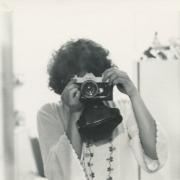 |
Nancy Alicia De Los Santos Reza | "My mission is to be a part of elevating the image of Latinas in all media. And to me, that means reflecting a realistic image." |
Nancy Alicia De Los Santos Reza was born and raised in Chicago, Illinois. Her parents were born in Texas and migrated to the big city after World War II. Nancy’s father, Nicolas, served in the Navy. Her mother, Micaela, was a stay-at-home mother and housewife, raising six children. Their own negative experience with speaking Spanish in Texas schools, led to the decision for their children to speak English only. |
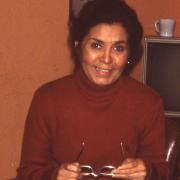 |
Ruth Mojica-Hammer | “Look for something to do, be involved, find a reason to exist!” |
As the Executive Director of Spanish Language Programming at a local Chicago TV station Ruth ‘Rhea’ Mojica-Hammer was also the first Mexican American woman to run for congressional office in the state of Illinois. Although she didn’t win, Rhea, went on to manage a successful campaign for the first Latina elected to public office in Illinois, Cook County Commissioner Irene Hernandez. |
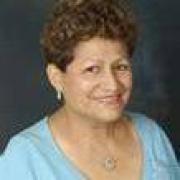 |
Blanca Vargas | “When I became a citizen in 1972 it’s like somebody put a little fire under me and said, ‘Blanca, you’re going to help other people become citizens as well.’ ” |
Blanca Vargas was born in Durango, Mexico on a rare snowy day; this inspired her name. Blanca spent her childhood in Durango, where she was competitive in sports, danced ballet folkorico and helped her father at his pharmacy. From him she learned the concept of helping others, as he often helped his clients that couldn’t afford badly needed medications. Blanca also learned British English from a private teacher at Escuela America during her youth. |
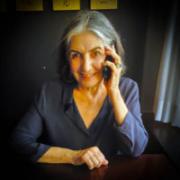 |
Dr. Elena Mulcahy | “I’m not interested in being remembered, I’m interested in having the work survive.” |
Dr. Elena Mulcahy was born on the South side of Chicago, Illinois on May 24, 1937 as Elena Berezaluce. Her parents were immigrants from Tabasco, Mexico. Although she grew up with her cousins on Chicago’s South side, her family lived in an area where there were few other Mexicans. Growing up bilingual, at an early age Elena not only helped translate for her primarily Spanish-speaking parents, but also for other community members and her fellow students and teachers. |
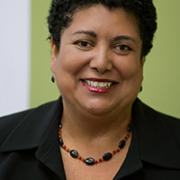 |
Rose Mary Bombela-Tobias | “I don’t want to just be a stewardess and just serve coffee – I want to be Lois Lane…” |
Rose Mary Bombela-Tobias was born in East Chicago, Indiana to Mexican migrants. After her father’s retirement from working in a steel mill while she was in grammar school, her family relocated to El Paso, Texas. There, she attended a Lithuanian school where she was one of the few Latinas. It was when she attended Urban High School, whose population was predominantly children of white military families, that she began noticing social politics. For example, she noted that as more Latino students enrolled in the high school, most were being placed in remedial courses. |
 |
Virginia Gomez Oviedo | “I think one of the biggest things is that they need to be unafraid, unafraid to look at things differently than how they’ve been told to look at things, whether it’s in school, even at home…do not be afraid, you’re going to probably take some criticism. You won’t think you know how to do it, but you’ll learn. It’s a fun path, living is fun.” |
Virginia Gomez Oviedo was born in 1945 on the Southeast side of Chicago. Her family first lived in the Maxwell Street area, a diverse port of entry for many of Chicago’s immigrants. When her family moved to the South Shore neighborhood, however, her community and school were not very diverse and the family faced racism. Facing this discrimination at a very young age fostered her political consciousness and activism. |
 |
Frances Sandoval Melendez |
Frances Sandoval Melendez was born in 1953 in the Trumbull Park area of Chicago, Illinois. She lived with her parents and three sisters, who were “the first Mexicans” to own a house in a mostly Jewish and Polish community. Frances grew up going to Catholic school and attended Saint Casimir’s, now known as Our Lady of Tepeyac. She started noticing inequality as young as at eight years old, when the nuns at her school called on and gave more positive attention to the white students than to her. Thus, Frances became aware of racism and inequality from an early age. |
|
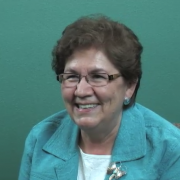 |
Sister Yolanda Tarango | "For [Las] Hermanas, our goal was always to stay with people. Our goal was always to immerse ourselves with people." |
From her beginnings as a girl who only spoke Spanish in east El Paso, Texas to becoming one of the most influential members of the Las Hermanas organization, Sister Yolanda Tarango is a proud Chicana feminist. She is the oldest of 7 children and started school in an “Anglo” Catholic school where she learned to speak English, but also experienced her first wave of institutionalized racism. |
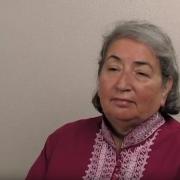 |
Maria Jimenez | "We were all very focused on the building of the community power, as opposed to winning the position." |
Maria D. Jimenez Flores was born in Coahuila, Mexico. Her parents, Raul Gomez Jimenez and Elva Flores, decided to immigrate to the United States when Maria was about six years old. Her paternal grandfather, Jaime Jimenez, was the first of her family to migrate to the United States. Maria and her family immigrated into Houston, Texas on May 9, 1957. Maria began to understand social inequality from a young age. With the influence of her maternal grandfather, Ramon Flores Ortega, and her father’s involvement in activism and social movements, Maria became interested in social justice. |
